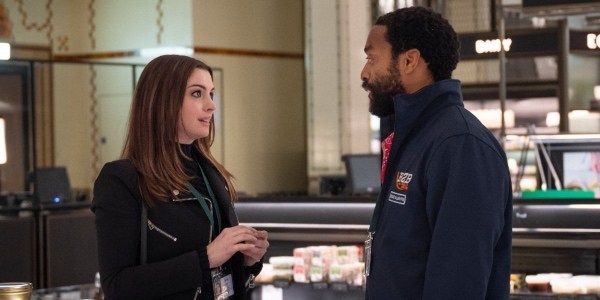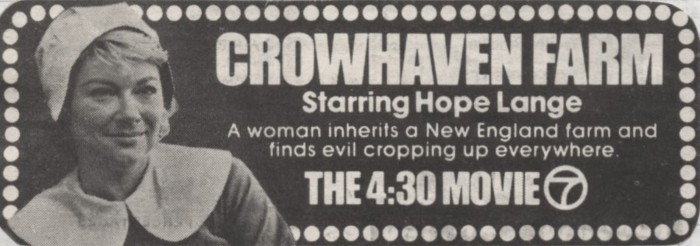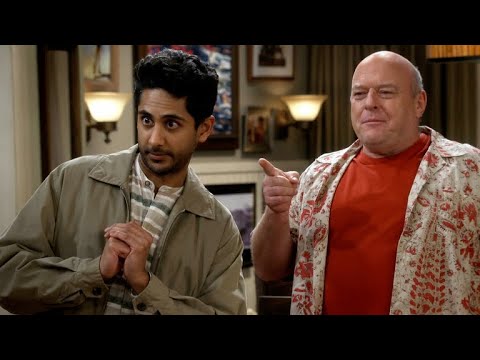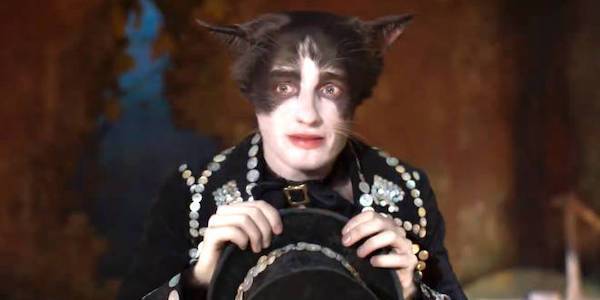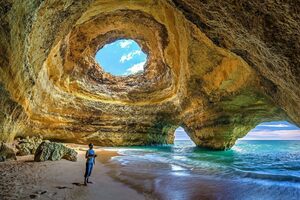Sarajevo Film Festival 2020: Interview With Director Martin Turk Of DON’T FORGET TO BREATHE
We sat down with Italo-Slovenian director Martin Turk following the screening of his latest Don’t Forget to Breathe at this year’s online edition of the Sarajevo Film Festival. In this interview, he discusses the sanguine aftertaste of young love, his complex identity, and the challenges of cinema in the COVID-era. Don’t Forget to Breathe, his second feature is a semi-autobiographical exploration of brotherhood and the dolorous onset of the first infatuation set in a provincial Slovenian town.
Monique for Film Inquiry: Hi Martin! Thanks for speaking to us at Film Inquiry today. It seems to me that there’s a stark difference aesthetically and even mood-wise between Don’t Forget to Breathe and your first feature, Feed Me With Your Words.
Martin Turk: Now I have worked on five films with the same DOP, I have made two features and three short films, and every time, our idea is, let’s make something different, let’s go to different things, let’s not repeat ourselves. This was my idea with this project, but it’s also connected with the story, I wanted to have from a visual point of view, something more poetic, a little bit out of time. So, the approach was quite different. In the writing, there were already some visual ideas, and we started talks with the DOP very early. I can say that some of the ideas that are in this film, I tried in a short film several years ago. I always try to be different, I’m bored exploring the same things.
Don’t Forget to Breathe situates the young Klemen at a crossroads between fraternity and jealousy in an otherwise perfect summer. What was the first desire with Don’t Forget to Breathe? Are there any elements of autofiction in the story?
Martin Turk: The starting idea of the film is a little bit autobiographical because it’s the relation between the two brothers and the brothers’ first love that comes and destroys this idyllic situation. This is something that happened to me and my brother when I was fifteen. So this idea that, when you’re fifteen, everything changes, from one day to another, was the motivation that gave me, you know, to start to rethink my past, and at the same time, what does it mean to be fifteen and have everything change? So this was this idea that I wanted to portray, but at the same time to have a movie about a coming of age that is not a childish movie, but is approached in an arty, serious way.
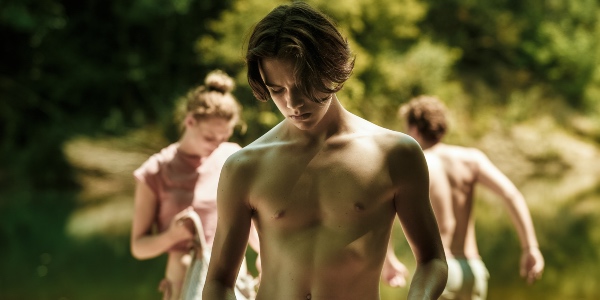
Sometimes in Slovenia, we have a problem that sometimes they make films for a younger audience that are too childish and that underestimate teenagers that are basically grown-up persons. So I wanted to have more complicated characters, that make decisions and that can change things, not just black and white. And also the relations and the sexual approach, all these things can be more complicated. I want it to be so that a teenager can watch this, but so can an adult, and think back on their past. So everybody can see the movie.
Both films wrestle with Slovenian identity on a subliminal level, how does that theme tie into your filmography?
Martin Turk: Basically, all of my films, Feed me with your Words, was partially shot in Italy and Slovenia, but you know, I feel myself Slovenian. My parents are Slovenian, we speak Slovenian, but I’m very connected with Italian culture. I grew up in Italy, but basically I’m Slovenian. I have both passports and go to Italy every second week because my parents live there. I’m very connected with Italy, but my films are Slovenian films. Now, in the next few years, I would like to make Italian films, with people who speak Italian, so I’d like to try the Italian market.
A Good Day’s Work, my previous film, was a Bosnian film I made for the Turkish TV in Sarajevo. It was produced by the Sarajevo Film Festival. And this is also the thing, I’ve made a film in Bosnia and now I want to make a movie in Italy. Just to experience other places to work.
What was it like having the film screen at Sarajevo Film Festival in an otherwise stagnant year globally?
Martin Turk: Roma [Film Festival] was the premiere. Sarajevo was one of the festivals, the film already travelled in some festivals before. I think the bad and the nice thing about this edition of Sarajevo was that it was online, so everyone from around the world could watch it. I’m a little bit sad because Sarajevo is such an amazing festival with such a good atmosphere and such a good audience, so I’m a bit sad that there was no live screening. But on the other side, there was a possibility for people like you, who can watch the movie from anywhere. So, you know, you have to accept this, the ways movies are presented now, it’s now different from how it was several years ago.
Where is the film headed next?
Martin Turk: For now, nothing. We will have a national festival in Slovenia in one month. I don’t know exactly where it will be. It was already co-produced by the Italian and the Croatian TV and the Slovenian TV, and I think it was distributed by a Chinese and Lithuanian distributor. We were hoping it would have the opportunity to go to the cinemas, but of course, we don’t know that the situation will be with the cinemas in a month. Also, we’re hoping the sales agent is able to sell the rights.
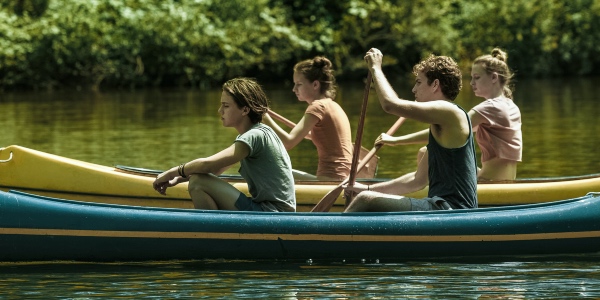
The visuals are quite striking and exude a certain kind of idyllic melancholy, was there any specific filmography or particular memories that inspired you and DOP Radislav Jovanov Gonzo?
Martin Turk: Let’s say that during the writing I had in mind three movies: American Honey, Mud and The Myth of The American Sleepover. But on the other hand, I have a very special way of working because I usually make the soundtrack of the movie in my mind. I play songs that have the atmosphere that I want and I listen to these songs during the writing process. It helps my mind to visualize things. My DOP [Radislav Jovanov Gonzo] is also very attached to music, we talk through songs and with atmospheres. Let’s say, for example, let’s make this Joy Division atmosphere. So it’s more about atmosphere and feelings. And when I was writing I wanted all the time to use the songs of Cocteau Twins. This was the poetic mood that I had in mind all the time. And also my composer Teho Teardo wrote some pieces before we started shooting. So this way of working is very complex, I think it’s an inspiration and also me and the DOP know each other for ten years, we didn’t work much before the shooting, we don’t use a storyboard, we have in mind the place that we created on the set.
For the soundtrack, how did you know you wanted Teho Teardo to compose the score?
Martin Turk: My wife went to a concert in Ljubliana, and when she came home she said, I think Teho Teardo should make the music for your film. So I said, okay, maybe. I contacted him, and since he works a lot, he worked for example with Sorrentino, he said, ‘Okay, first I read the script, and if I like it I’ll work on it with you.’ And after one week he said, ‘I read the script, I liked it, I’ll work with you.’ He composed a 40 minute soundtrack, and he sent his ideas for the script, so I had something for the first time before I began shooting.
The backdrop of the Slovenian countryside, rolling hills, and rivers almost becomes a character in itself, why did you choose this location?
Martin Turk: This location is where my wife is from. I wrote the script on this location, I knew the places, all I wrote in the script were these places – it’s also a countryside that’s not really used in Slovenian movies. Only one film was shot here, and it’s a place that’s very real, very open, it’s very important for me, and it’s important for the character, anytime he has problems he goes to nature, to the rivers, so he’s very connected to this landscape. For me, it was one of the main characters, the river has a very big connection with everything, I think it worked very well, it was very nice to shoot there, the atmosphere with the crew was very nice. It was very relaxed.
I’ve found that your filmography has quite an interesting narrative structure, can you tell me a little about that, what’s the process like?
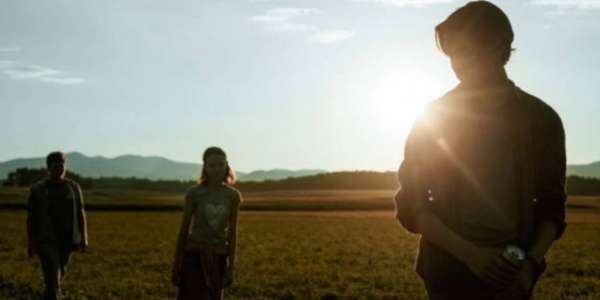
Martin Turk: I don’t know because this movie had a really long story since it’s so personal, and it started from something that happened to me. First, it was an idea for a short film when I was twenty-one and studying in film school, but I didn’t have the strength to write it completely. So I put it away. I returned to the story, I think in 2011, because my wife, the producer of the project, liked the idea and said, you need to restart it, it’s a good story. And then in 2011, I wrote the first draft and I stopped. I couldn’t make more than one draft and returned again to the story in 2016, but it didn’t go anywhere, so I asked a friend to co-write, to come to the structure it is now. The main plot is of course mostly the same as the first draft. The main plot: two brothers; a girl that comes and destroys everything. The idea was to be all the time with the main character and understand his situation, sometimes he’s very evil, but it’s because he’s young and doesn’t know how to understand his feelings.
What was it like working with the cast, were there any language barriers?
Martin Turk: The language barrier is no problem, I’m from the Slovenian minority in Italy. I was born and raised in Italy but when I was twenty I went to study in Ljubljana. All my life I’ve been bilingual, so I speak Italian and Slovenian at the same level, let’s say, like madrelingua. So the language is not an issue. My DOP is Croatian, so I speak Serbo-Croatian. We had a very long work in finding the cast, and had very long working days. Slovenia is very small so it’s not so easy. From one point of view, it’s smaller, but on the other side, I tried to find characters that reminded me of myself, and actors that were similar to the characters.
And then I had a theatre director that helped me to work with the kids, we worked for three months with them until the shooting. It was very important that they were together for these three months, so they got the feeling that they were family. The two main actors that played the brothers were playing tennis together, going to eat together, playing together. They had to come to the shooting already having some feeling for one another. They also had to learn to play tennis, to drive, the older girl had to learn to dance. They had to be prepared, no improvisation, so that me and the DOP could create on the set. But it was good work, the actors were very professional.
That brings me to my final question: what can we expect in the future, are any other projects in the works?
Martin Turk: It’s a complicated situation now with this coronavirus thing, we have a moment where everything is quite blocked. Because of this crisis, there’s not much money for culture, it’s a little complicated now. I also started teaching at the University in Nova Gorica. I wrote a new script with a friend that will be placed in Italy, on the border between Slovenia and Italy, this problem that we have, Slovenian identity in Italy. So I hope it will work and we will get some money in the next few years. As you know, making movies are not so easy to get financed. Now I want to come back to the place where I was born, I want to search and tell the story of what it means to live between the borders, where it’s mixed and there are many communities.
It’s my return to the things that have connected me to the past.
Film Inquiry would like to thank Martin Turk and Freuds for setting up the interview.
Watch Don’t Forget to Breathe
Does content like this matter to you?
Become a Member and support film journalism. Unlock access to all of Film Inquiry`s great articles. Join a community of like-minded readers who are passionate about cinema – get access to our private members Network, give back to independent filmmakers, and more.
Join now!
